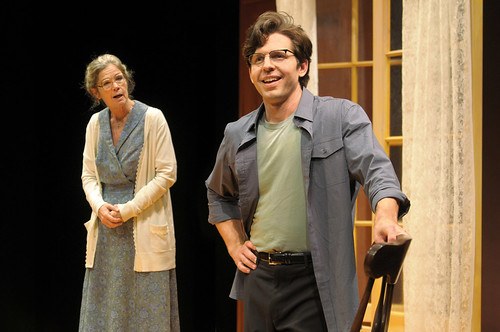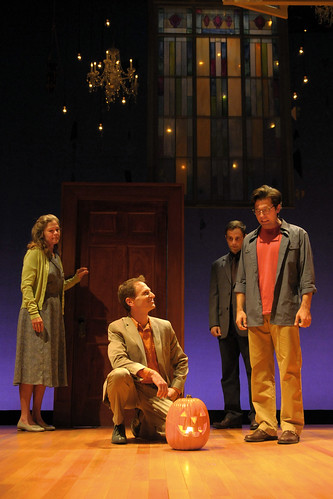Grace, God and family in Berkeley Rep's brilliant Bible
 Linda Gehringer is Mary and Tyler Pierce is Bill in Bill Cain’s world-premiere drama How to Write a New Book for the Bible at Berkeley Repertory Theatre. Below: Gehringer (far left) and Pierce (far right) are joined by (from left) Leo Marks as Pete and Aaron Blakely as Paul. Photos by www.kevinberne.com Sometimes you experience a work of art – for me that art is usually theater – and it connects you with something bigger and more powerful than your individual experience. You connect with the other audience members, the actors, the designers and, especially, the writer. When that connection is made, the communal heart of theater is so alive, so vast and so inexplicably moving that transcendence does, however temporary, seem a viable option.Bill Cain’s How to Write a New Book for the Bible is one of those experiences. This world-premiere production at Berkeley Repertory Theatre (a co-production with Seattle Repertory Theatre) is the most moving and insightful new play since Margaret Edson’s Wit.Like that play, Cain examines what he describes as “the final stations in the ordinary death of an ordinary woman.” And that woman happens to be his mother. But more than that, Cain’s drama is about family, his and mine and yours. The more specific the details of his family – good and bad – the more his family resembles yours. The details themselves may be different, but somehow in the sharing, everything his family does and goes through somehow relates to you and your family.This is an extraordinary play, and it will affect everyone differently. At Wednesday’s opening-night performance on the Thrust Stage, audience members were visibly moved throughout the show’s nearly 2 ½ hours. I was in tears multiple times, and it wasn’t always because what was happening on stage was sad. When you’re not being moved, chances are good Cain is making you laugh, often at his own expense.
Linda Gehringer is Mary and Tyler Pierce is Bill in Bill Cain’s world-premiere drama How to Write a New Book for the Bible at Berkeley Repertory Theatre. Below: Gehringer (far left) and Pierce (far right) are joined by (from left) Leo Marks as Pete and Aaron Blakely as Paul. Photos by www.kevinberne.com Sometimes you experience a work of art – for me that art is usually theater – and it connects you with something bigger and more powerful than your individual experience. You connect with the other audience members, the actors, the designers and, especially, the writer. When that connection is made, the communal heart of theater is so alive, so vast and so inexplicably moving that transcendence does, however temporary, seem a viable option.Bill Cain’s How to Write a New Book for the Bible is one of those experiences. This world-premiere production at Berkeley Repertory Theatre (a co-production with Seattle Repertory Theatre) is the most moving and insightful new play since Margaret Edson’s Wit.Like that play, Cain examines what he describes as “the final stations in the ordinary death of an ordinary woman.” And that woman happens to be his mother. But more than that, Cain’s drama is about family, his and mine and yours. The more specific the details of his family – good and bad – the more his family resembles yours. The details themselves may be different, but somehow in the sharing, everything his family does and goes through somehow relates to you and your family.This is an extraordinary play, and it will affect everyone differently. At Wednesday’s opening-night performance on the Thrust Stage, audience members were visibly moved throughout the show’s nearly 2 ½ hours. I was in tears multiple times, and it wasn’t always because what was happening on stage was sad. When you’re not being moved, chances are good Cain is making you laugh, often at his own expense. Fully an autobiographical drama, the characters on stage are Cain, his parents, Pete and Mary, and his older brother, Paul. Bill (Tyler Pierce) is the writer in the family and the teller of this tale. He flips us back and forth in time – his parents’ courtship, his brother’s experience in Vietnam, his father’s battle with cancer – but primarily he’s sharing the experience of caring for his 82-year-old mother (Linda Gehringer) in the last year of her life.To make sense of the Cain family, we have to understand that they were – prepare for a shock – a functional family. They fought, but their fights had rules. They weren’t perfect or all loving all the time, but their family unit worked, and they all seemed to genuinely care about one another.Cain writes with such love for his family, and the fact that he’s so eager to share his family with audiences makes his story all the more endearing.The cast, under the sensitive direction of Kent Nicholson, is superb. It’s hard to imagine a more appealing guide than Pierce or a more dynamic woman than Gehringer’s Mary. Aaron Blakely as older brother Paul (and a number of smaller roles) makes a powerful impression, especially when Paul and Bill pay a nighttime visit to the Vietnam Memorial in Washington, D.C.Leo Marks charms as Pete, the Cain patriarch, and there’s an especially moving scene when Pete, in the throes of his final illness, wanting Bill to read to him but really it’s just a pretense for Pete to be able to stare at his son.With a brilliant play comes an equally brilliant set and lighting design. Scott Bradley wisely leaves the stage (with its gorgeous wood floor) bare, save for a doorway and a wooden chest that is utilized in a number of inventive ways. Occasionally items float in from above – a table lamp (with no need for a table), a window, the moon, the Washington Monument – but the set is impressionistic, much like the play.The most dominant item hovering above the stage is a beautiful stained-glass window, which catches Alexander V. Nichols’ light in comforting ways. Surrounding this window are fragments of mirror, which also catch the light and throw it back on the audience.How powerful to turn the play’s metaphorical illumination into something real – real light coming from the stage onto faces in the audience. It’s all of a piece in this Bible experience – this profoundly wonderful and deeply personal experience.The masterful Cain has created a sort of theatrical sermon here. He deconstructs and then reconstructs the elements of a sermon – lesson, illumination, inspiration – and makes them mean something. He grapples with the very notion of God, which he says can be found in the details of a family.At one point, Bill is talking directly to the audience and gives us a glimpse of the infinite: “Half the time, I don’t even know what God is. But I do – sometimes – experience a mystery – a vast and caring mystery – that gets past my defenses and into my soul and says – I – even I might matter. Vastly. That – limited as I am – I might be irreplaceable, unrepeatable and of unlimited worth.”Then Bill pauses.“When that happens, that’s called God.”[bonus interview]I interviewed Bill Cain for the San Francisco Chronicle. Read the feature here.I couldn't fit everything into that interview, so read the "outtakes" here.FOR MORE INFORMATIONBill Cain’s How to Write a New Book for the Bible continues through Nov. 20 on Berkeley Repertory Theatre’s Thrust Stage, 2025 Addison St., Berkeley. Tickets are $14.50-$73. Call 510-647-2949 or visit www.berkeleyrep.org for information.
Fully an autobiographical drama, the characters on stage are Cain, his parents, Pete and Mary, and his older brother, Paul. Bill (Tyler Pierce) is the writer in the family and the teller of this tale. He flips us back and forth in time – his parents’ courtship, his brother’s experience in Vietnam, his father’s battle with cancer – but primarily he’s sharing the experience of caring for his 82-year-old mother (Linda Gehringer) in the last year of her life.To make sense of the Cain family, we have to understand that they were – prepare for a shock – a functional family. They fought, but their fights had rules. They weren’t perfect or all loving all the time, but their family unit worked, and they all seemed to genuinely care about one another.Cain writes with such love for his family, and the fact that he’s so eager to share his family with audiences makes his story all the more endearing.The cast, under the sensitive direction of Kent Nicholson, is superb. It’s hard to imagine a more appealing guide than Pierce or a more dynamic woman than Gehringer’s Mary. Aaron Blakely as older brother Paul (and a number of smaller roles) makes a powerful impression, especially when Paul and Bill pay a nighttime visit to the Vietnam Memorial in Washington, D.C.Leo Marks charms as Pete, the Cain patriarch, and there’s an especially moving scene when Pete, in the throes of his final illness, wanting Bill to read to him but really it’s just a pretense for Pete to be able to stare at his son.With a brilliant play comes an equally brilliant set and lighting design. Scott Bradley wisely leaves the stage (with its gorgeous wood floor) bare, save for a doorway and a wooden chest that is utilized in a number of inventive ways. Occasionally items float in from above – a table lamp (with no need for a table), a window, the moon, the Washington Monument – but the set is impressionistic, much like the play.The most dominant item hovering above the stage is a beautiful stained-glass window, which catches Alexander V. Nichols’ light in comforting ways. Surrounding this window are fragments of mirror, which also catch the light and throw it back on the audience.How powerful to turn the play’s metaphorical illumination into something real – real light coming from the stage onto faces in the audience. It’s all of a piece in this Bible experience – this profoundly wonderful and deeply personal experience.The masterful Cain has created a sort of theatrical sermon here. He deconstructs and then reconstructs the elements of a sermon – lesson, illumination, inspiration – and makes them mean something. He grapples with the very notion of God, which he says can be found in the details of a family.At one point, Bill is talking directly to the audience and gives us a glimpse of the infinite: “Half the time, I don’t even know what God is. But I do – sometimes – experience a mystery – a vast and caring mystery – that gets past my defenses and into my soul and says – I – even I might matter. Vastly. That – limited as I am – I might be irreplaceable, unrepeatable and of unlimited worth.”Then Bill pauses.“When that happens, that’s called God.”[bonus interview]I interviewed Bill Cain for the San Francisco Chronicle. Read the feature here.I couldn't fit everything into that interview, so read the "outtakes" here.FOR MORE INFORMATIONBill Cain’s How to Write a New Book for the Bible continues through Nov. 20 on Berkeley Repertory Theatre’s Thrust Stage, 2025 Addison St., Berkeley. Tickets are $14.50-$73. Call 510-647-2949 or visit www.berkeleyrep.org for information.